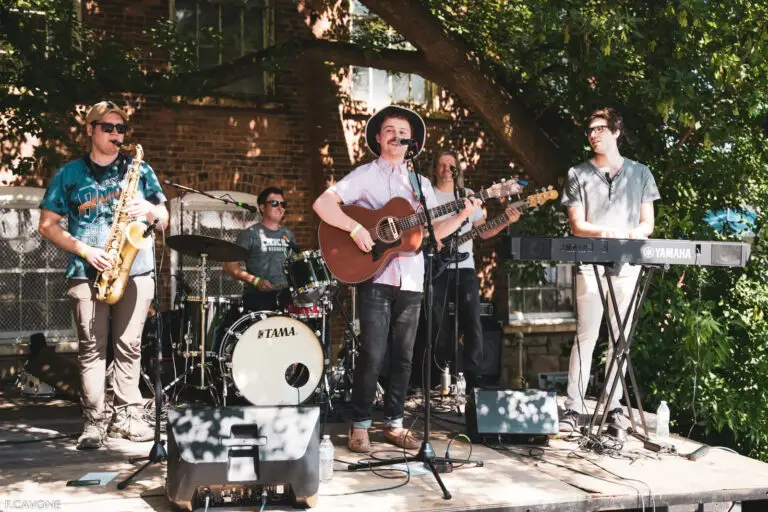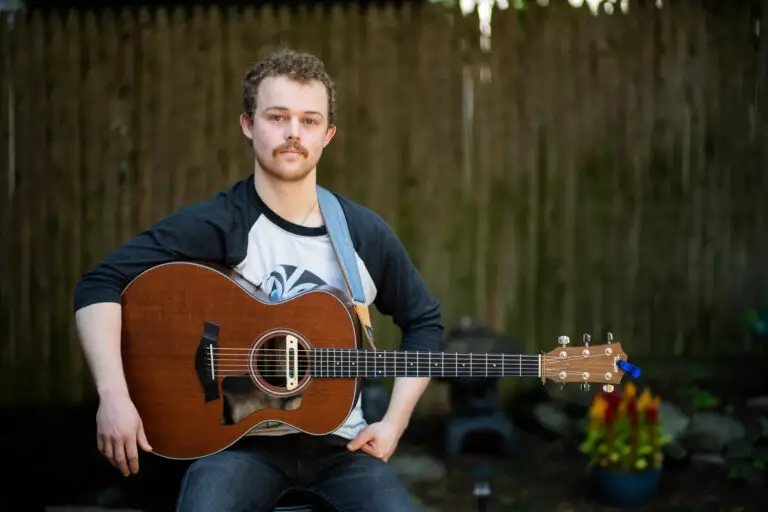Unity is a great thing in music. Having one person with all the spotlight supported by shadow people makes for good reality television, but in real, vibrant people, the most passionate players seek each other out for lessons in applied sorcery. One such coven surrounds Reese Fulmer and makes up Reese Fulmer and the Carriage House Band. Their sound reflects the yearning of music holding hands with collective years of talent. I sit with Reese and discuss the finest in carriages.

Liam Sweeny: You’ve said that Reese Fulmer and the Carriage House Band is as much a concept as a band. It’s an evolving ensemble of some of the area’s top performers. People, talented people, come and work on your music. And for there to be that kind of draw, your music has to have a deep appeal. What do you feel draws people to your work?
Reese Fulmer: I wish I knew the right answer for this question. I think one reason is that I approach my own music with a reverence that resonates with the way they feel about music in general. I love my music and I love how they help it grow. I recognize the work they do on stage, in preparation, and with their other groups, and deeply respect the talent they have and I’ve made it clear that I trust them completely. I value their time and try to keep it interesting for them, and I make sure I’m organized and easy to work with.
If there is any sort of deep appeal, I think it’s as much a credit to the variety of live music and the quality of the players I’ve been exposed to as anything else. There’s a wide range of sounds that make their way into my writing and then every time I get to play with the band I hear new things and it influences my work from there. So through that I’ve been able to improve my own songwriting and continue bringing them new stuff and new ideas, and I think they’ve seen that progress and embraced the way I’m going about being a bandleader.
LS: Working with other musicians is fulfilling, but its also a challenge. Because as much as you have a vision for your work, they’re going to have an interpretation of it that you might not see coming. How to you manage to keep your sound the way you like it while allowing others to give it new directions?
RF: When we play live, everyone in the band has total freedom. I come up with the arrangements and some vague ideas about a vibe I think makes sense but within that structure I never tell anyone what to do. I throw a bunch of colors at the wall and they react to each other. I rarely have a plan for who takes which solos, I decide in the moment and they stay on their toes. They know that all I want is for them to be themselves. That probably gets at your first question too. The Carriage House Band sound will be whatever they decide to make it and that’s the way I like it.
On the studio work I sometimes give more specific direction, but again I’m calling on people because I know their sound and I want to hear their version of my idea. Most of my guidance has to do with dynamics and timing. I think Chris Carey and I have a good production balance where I outline the broad strokes and Chris has such a great ear and can finetune harmonies and smaller details within that structure.

LS: You were nominated for a 2022 Listen Up award, Radioradiox’s first award show. Whether or not you have high regards for awards, this was the first of its kind, and you made a list drawn up entirely by supporters and fans. Seeing as how we live or die by support, how important do you think fan recognition is?
RF: This is a tough one. I think it’s easiest if I don’t mention my regard for awards. But in terms of lifting the presence of an artist or band in a regional music scene, the opportunity to be nominated and recognized in that capacity where it puts your name in front of a community that really cares about music is important. To write someone’s name in a category for nomination should mean that you must have been impacted by their music on some level, and to me that right there is the most compelling part. And as an annual event it serves another important purpose where we can gather and celebrate how prolific and creative we’ve collectively been over the past year.
LS: At this writing, which may be surpassed, you have an EP out called All the Time in the World. It features an impressive cast of characters, including two people I’ve followed since being in ink, Brian Melick and Caity Gallagher. And that’s not to really play favorites or anything. Tell us about the album, and what you were imagining for it?
RF: So the full vision for the album is to be a complete 12 song project. At this point I’ve got four recorded, the studio versions anyway, and the rest I’ll put together as I go. There may be a few live recordings released in the meantime. The common thread for the writing on the album has to do with our experience of time, which was a theme that I kept finding in my songs. It really appears in all my writing to some extent, but these are a collection of the earlier works. Front to back, it will probably have a broad range of production and ideas, most of which I haven’t thought of yet. And yes, I have a massive amount of respect for all the musicians featured on the project so far. They’ve approached it with a lot of detail and care and already made it into something larger than I could have designed.
LS: A theme that I see surrounding you is versatility. Your music reflects it, one couldn’t imagine anything coming out of what you do that wasn’t versatile. But versatility is relative. You could have a country song where every player can play every part, and they’re versatile, but it’s the same song. What does versatile mean to you?
RF: There’s a belief in martial arts that the best form is to follow no form at all, which implies a certain level of fluency in all of them. I think that the foundation of how I’ve learned about music has been without form for the most part, at least within the independent roots scene as a whole. The bands I’ve connected with have played really loose and relaxed, regardless of genre or background, and communicated the joy of that feeling to the audience. All those different playing styles are just variations on that same language. The players I’ve been lucky enough to play with have that level of fluency on their instruments and can hear whatever sound I give them and give back what it needs from them.
LS: The future looms large, and there’s no end to the projects that could be forthcoming, not just for you but for the people in the cast and crew. Can you tell us what you’re doing in the near future, and maybe a few projects of some of the other players? And in particular, anything that brings your general ensemble together. The floor is yours.
RF: Thanks for giving me the chance to talk about this stuff! I’ve got full band release shows at the Park Theater on 1/26 and the Cock n Bull on 2/23 which will coincide with tracks 3 and 4 being available online. I’m starting to plan out my spring and summer schedule, which should include some trips around to small northeast venues. Most of that will be solo or duo/trio whenever possible. And playing as much as I can with larger versions of the band, at venues around the area and on festival stages. Hopefully we’ll keep finding people that want to listen!
There are a ton of projects that are connected to Carriage House Band players. To narrow it down a bit, here’s a list of regional bands (in no order and definitely incomplete), with familiar faces behind them, to pay attention to: Honeysuckle, Rodeo Barons, North & South Dakotas, Blue Ranger, Super 400, Family Tree, Drank the Gold, Wax Shamu, the full band projects of Girl Blue, Angelina Valente, Sydney Worthley, Carolyn Shapiro, and Hold on Honeys, O-Man & The Nite Trippers, Golfstrom, Heard, Daisycutter, Jim Gaudet & The Railroad Boys… all of them creating amazing music. I’m grateful that they find ways to share their time and talent on my music here and there.
This interview originally appeared in The Xperience Monthly.


Comments are closed.